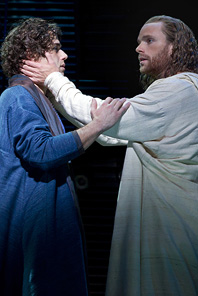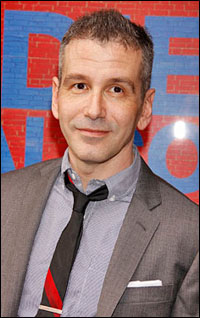
Monologuist Mike Daisey, who has been enjoying a career peak due to the critical success of his work The Agony and the Ecstasy of Steve Jobs — which took a hard, unflinching look at the human toll in injury and misery behind the shiny objects we buy from Apple — is now suffering through the very nadir (and possibly the end) of his career owing to the very same work.
Daisey's script, which was recently revived at the Public Theater, seemed to be that rare piece of theatre that resulted in real-life change. Following its revelations of the mistreatment and abuse of the Chinese workers that manufacture Apple products — workers Daisey told of encountering at their factory — journalists began to reassess Jobs' legacy and the Apple business model, and investigate the claims highlighted in the play. Apple's subsequent attempts to become more transparent about their workings in China were credited by many to Daisey's "J'Accuse."
"This American Life," the public radio show hosted by Ira Glass was also impressed. The program decided to air excerpts from the show in January. The broadcast (and podcast) proved immensely popular, and was heard by thousands of listeners. But, then, on March 16, "This American Life" took the extraordinary step of retracting the entire episode. National Public Radio's "Marketplace" China correspondent Rob Schmitz sought out Daisey's Chinese translator to substantiate Daisey's personal stories of his encounters with laborers. The translator disputed portions of Daisey's account, including claims that he visited a factory in Suzhou and his gripping story of a maimed factory laborer who sees a working iPad for the first time. It soon became clear that Daisey had embellished or fabricated many of the memoir aspects of the monologue. Airing the weekend of March 16, an entire episode of "This American Life" (titled "Retraction") was devoted to detailing the credibility gaps in Daisey's work.
Instantaneously, the journalistic community — which had embraced the play as a piece of trenchant truth-telling about corporate treachery and consumer culpability — piled onto Daisey. New York Times theatre critic Charles Isherwood, who had praised the work, wrote a scolding opinion piece. "Mr. Daisey may not claim to be a journalist, but there is little question that in his show, which he has been performing since 2010, he gives no indication that some of the events he describes as having witnessed himself were embellished or based on incidents that took place elsewhere," he wrote. Respected Times reporter David Carr also weighed in heavily against Daisey. Alec Baldwin tweeted his disgust. Time Out New York drama critic Adam Feldman manned a March 22 panel on the subject at the Public Theater. In one week, it seemed, Daisey was attacked for his moral turpitude more than Apple had been in the year since Agony first bowed in Seattle.
The story broke just as Daisey was wrapping up a successful return engagement at The Public Theater, where it played a sold-out run last fall. Daisey did his best to control the damage. In a response dated March 16, Daisey stated on his website, "What I do is not journalism. The tools of the theatre are not the same as the tools of journalism." The Public also issued a statement, saying, "In the theatre, our job is to create fictions that reveal truth — that's what a storyteller does, that's what a dramatist does. The Agony and the Ecstasy of Steve Jobs reveals, as Mike's other monologues have, human truths in story form… Mike is an artist, not a journalist. Nevertheless, we wish he had been more precise with us and our audiences about what was and wasn't his personal experience in the piece." Daisey has said that he stands behind his work. And a select few others have lined up behind him. The Woolly Mammoth Theater Company, which will present a return engagement of the play this summer, said on its website, "We believe in the essential truth of Mike's storytelling. Mike's performances fuse fact, memoir and polemics with healthy doses of bombast and, for comic effect, exaggeration in order to passionately deliver an urgent message."
But it's pretty clear at this point that few others have Daisey's back. Agony will probably soon end up in the dustbin, with few theatres willing to host the show, and few theatregoers willing to buy tickets to a piece of nonfiction theatre that turns out to be more theatre than nonfiction. The undeniable and uncomfortable truths revealed in the piece will likely be sacrificed to and subsumed by the indignation stirred up by the controversy. And pundits and columnists will continue to debate Daisey's misdeeds through blog posts and tweets and texts — no doubt using their iPhones and MacBooks to do so.
***
 |
||
| Josh Young and Paul Nolan |
||
| photo by Joan Marcus |
The show had been roundly praised — well, as praised as a Lloyd Webber musical can be — in previously stagings in Ontario, Canada, and La Jolla, CA. But this is New York, where critics are trained to be suspicious of slick entertainment (or anything with roots in regional theatre). And such was the case. Most felt duty bound to inform the public that this retelling of Christ's final week was "silly," "mindless," "flat-footed," and "absurd."
But many of those same reviews grudgingly uttered a few good things about the staging and performances. Josh Young, as Judas, was particularly praised. USA Today hit a common note, noting "Rather than try to cut through the rock-operatic bombast of Andrew Lloyd Webber's music and Tim Rice's lyrics, director Des McAnuff revels in it." And Hollywood Reporter observed, "The 1971 religious rock opera remains a psychologically lite relic of its time, but it gets propulsive treatment in this energized, vocally robust revival." Even the Times had to admit the mounting was "brisk and lucid." (There was no review that didn't mention the fleet two-hour running time.)
Also opening on Broadway this week was Once, a stage version of the indie flick of the same name that borrows the 2007 movie's songs by Glen Hansard and Markéta Irglová, who also played the would-be lovers in the film. The show, which debuted last year at New York Theatre Workshop, stumbled on its way to Broadway when New York Times critic Ben Brantley, disregarding the producers' plans, failed to fall in love with the story, finding it too twee and precious.
Well, since then, Brantley apparently received a copy of the Once road map, and has seen the light. His re-review was basically a reversal. "On Broadway," he wrote, "what is essentially the same production feels as vital and surprising as the early spring that has crept up on Manhattan. It’s not just that what seems hokey downtown can read quirky in Midtown, where overpriced-ticket buyers tend to prefer familiarity to novelty… But in its new incarnation this musical reveals itself to be a show that was always meant (and probably lusting) for a brighter limelight and a bigger stage. You have to watch out for those shy ones."
The critics who liked it before, meanwhile, still liked it. It was "pure, moving and inventive," "warmly affecting show, crafted with profound respect for the power of music," and "a rare combination of intelligence, warmth and musicality."
 |
||
| David Cromer |
||
| Photo by Joseph Marzullo/WENN |
A few years ago, Chicago helmsman Cromer strung together a few critical (and sometimes commercial) hits at the teeny theatres in Greenwich Village — including Orson's Shadow, Adding Machine and Our Town. Broadway bigwigs took note and bought Cromer a Metrocard to Times Square, where they set him up with big-deal productions of Brighton Beach Memoirs, Broadway Bound and The House of Blue Leaves. These all failed, and the Broadway bigwigs were stunned. (They are always stunned when their logic-free, deathless Throw-The-New-Golden-Boy-At-Any-Project-And-See-If-He-Sticks strategy doesn't work — for the umpteenth time.)
So, now Cromer is back at the Barrow Street. And guess what? He's got another big critical and popular hit!
The play is Nina Raine's Olivier Award-nominated drama Tribes, which opened to raves March 4, and has a cast featuring Mare Winningham and Jeff Perry. It tells of a young deaf man who escapes the emotional cacophony of his dysfunctional family when a woman who is losing her hearing comes into his life. It has now been extended through Sept. 2, producers announced on March 21.
The producers also announced that Tribes broke all records at the Barrow Street Theatre box office and is now officially the best-selling show in the West Village theatre's history. Which means: Cromer's new play is selling better than the older Cromer plays. ***
 |
||
| Katharine McPhee on "Smash." |
||
| photo by Will Hart/NBC |
***
In the cultural and architectural revival of 42nd Street that has gone on over the past 15 years, the Times Square Theater has long held the role of the red-headed stepchild among the strip's various historic stages. The New Victory was resurrected as a haven for kid's theatre. Disney did a Lazarus act on grand old New Amsterdam. Garth Drabinsky conflated the Lyric and the Apollo into one theatre, now known as the Foxwoods. And the Roundabout Theatre Company converted the Selwyn into its own home base, the American Airlines Theatre.
But nobody knew what to do with the Times Square Theater, a short, colonnaded house built by the Selwyn brothers that hadn't been a legit theatre since 1934. It was too small to function as a proper theatre, experts said.
Now, 20 years after the property came under the protection of the city, someone's finally come up with a solution. The Times Square Theater will be renovated to house a starry, "immersive" film experience that celebrates the history of Broadway musicals. Broadway 4D Theaters, LLC announced that it had entered into a long-term lease for the venue. Details were few, but the film experience will feature "the greatest songs from the greatest Broadway musicals, penned by the most famous songwriters, including Rodgers and Hammerstein, Kander and Ebb, Charles Strouse and Martin Charnin as well as many others" and "will be performed by Broadway and Hollywood stars." The organizers declined to comment further about their work in progress.










